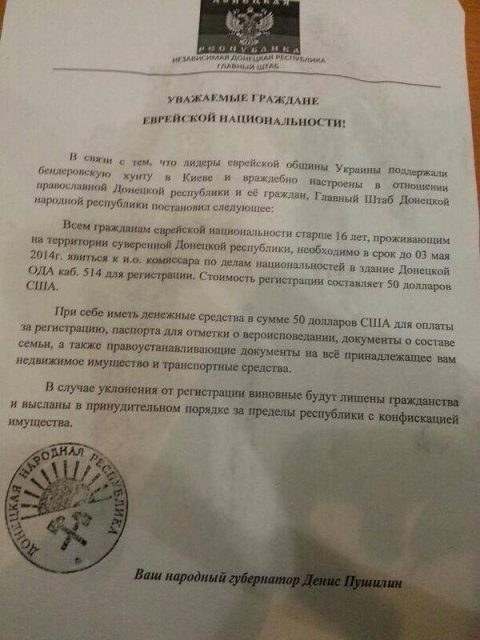
Leaflets ordering Jews in the Ukrainian city of Donetsk to provide a list of property they own and pay a registration fee.
(RNS) While Ukrainian Jewish leaders recognized the flier as a political dirty trick, it caused widespread outrage here in the United States, where just about everyone — from Jewish community leaders to the State Department — was immediately struck by its echoes of the Nazi policies that led to the Holocaust in Europe.
And yet unfortunately, this was just the latest escalation in a series of political maneuvers in Ukraine where the anti-Semitism card has been repeatedly overplayed.
Manufactured incidents of anti-Semitism have been cynically used to discredit political opponents as anti-Semites, whether they are, or not. In recent years, some Ukrainian political operatives have spread rumors that opposing candidates are Jews, likewise whether they are, or not.
Last year, political operatives, presumably of deposed former President Viktor Yanukovych, sent a dozen young men to an opposition rally with T-shirts that read “Beat the Jews!” on one side, and “Svoboda,” the name of the ultra-nationalist opposition party, on the other.
Both classical political anti-Semitism and the manufactured, manipulative version rely on a common assumption, that a significant number of Ukrainian citizens do not consider their Jewish compatriots to truly be part of the Ukrainian nation.
That attitude, unfortunately, continues to play a significant role in the Ukrainian nationalist movement. The Svoboda party has a history of anti-Semitism and venerates Stepan Bandera, a leader of the Ukrainian nationalist movement of the 1930s and 1940s. Bandera allied with the Nazis during World War II when he thought it was in the interest of his movement and was complicit in mass killings of Jews and Poles by Ukrainian partisans.
When Jews are considered a natural part of the Ukrainian nation, anti-Semitism in Ukraine should wane and the temptation to use anti-Semitism in politics should follow.
And that will be a relief, because anti-Semitism is a big enough problem without having anyone with a political ax to grind to add to it artificially.
A positive first step was taken in today’s statement from the U.S., the European Union, Russia and Ukraine, with the firm, clear and direct condemnation of “all expressions of extremism … including anti-Semitism.”
To change Ukraine’s atmosphere of insecurity, political, civic and religious leaders in Ukraine and Russia must continue to reinforce this message.
(Abraham H. Foxman, a Holocaust survivor, is national director of the Anti-Defamation League.)
YS END FOXMAN





